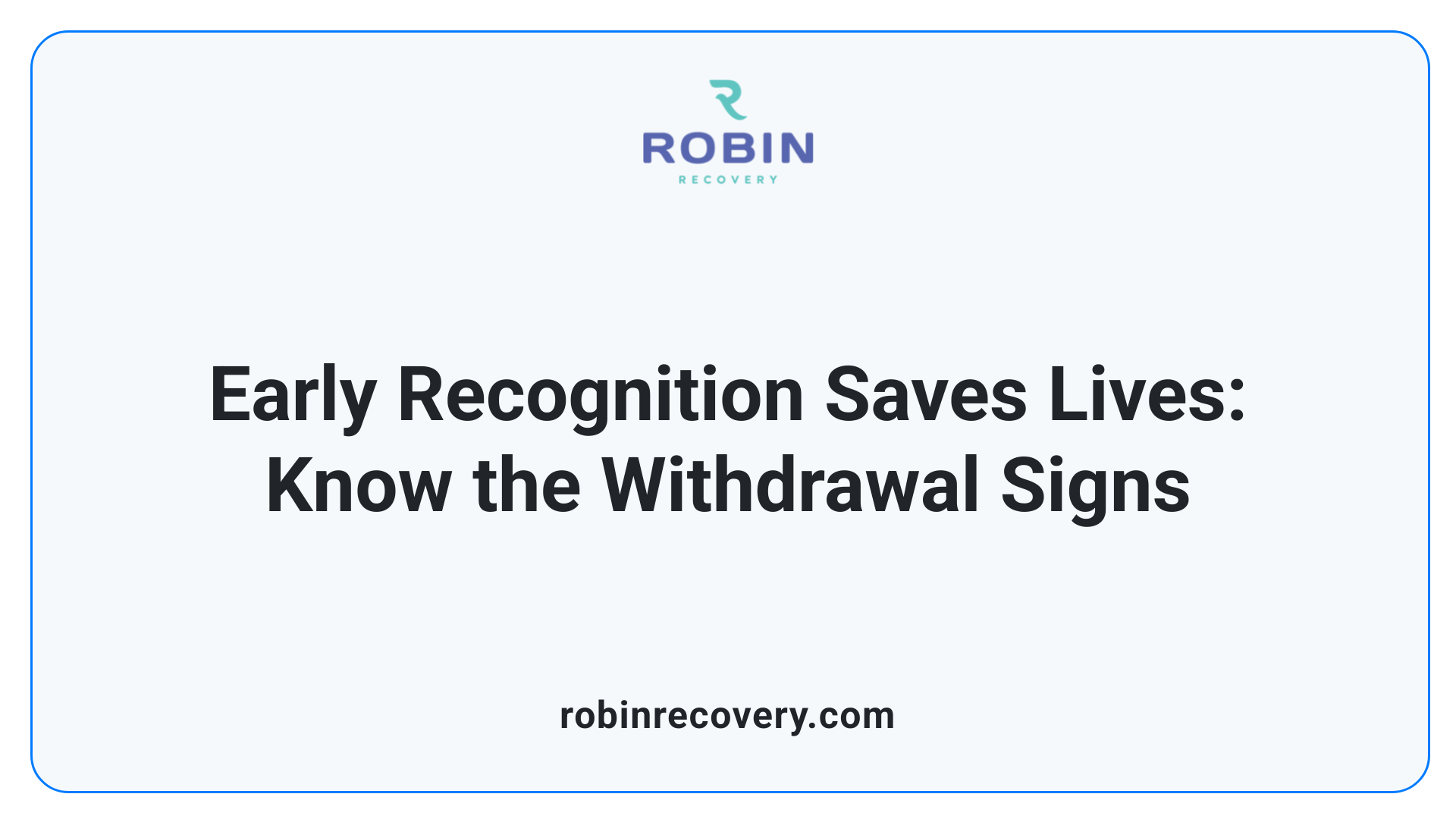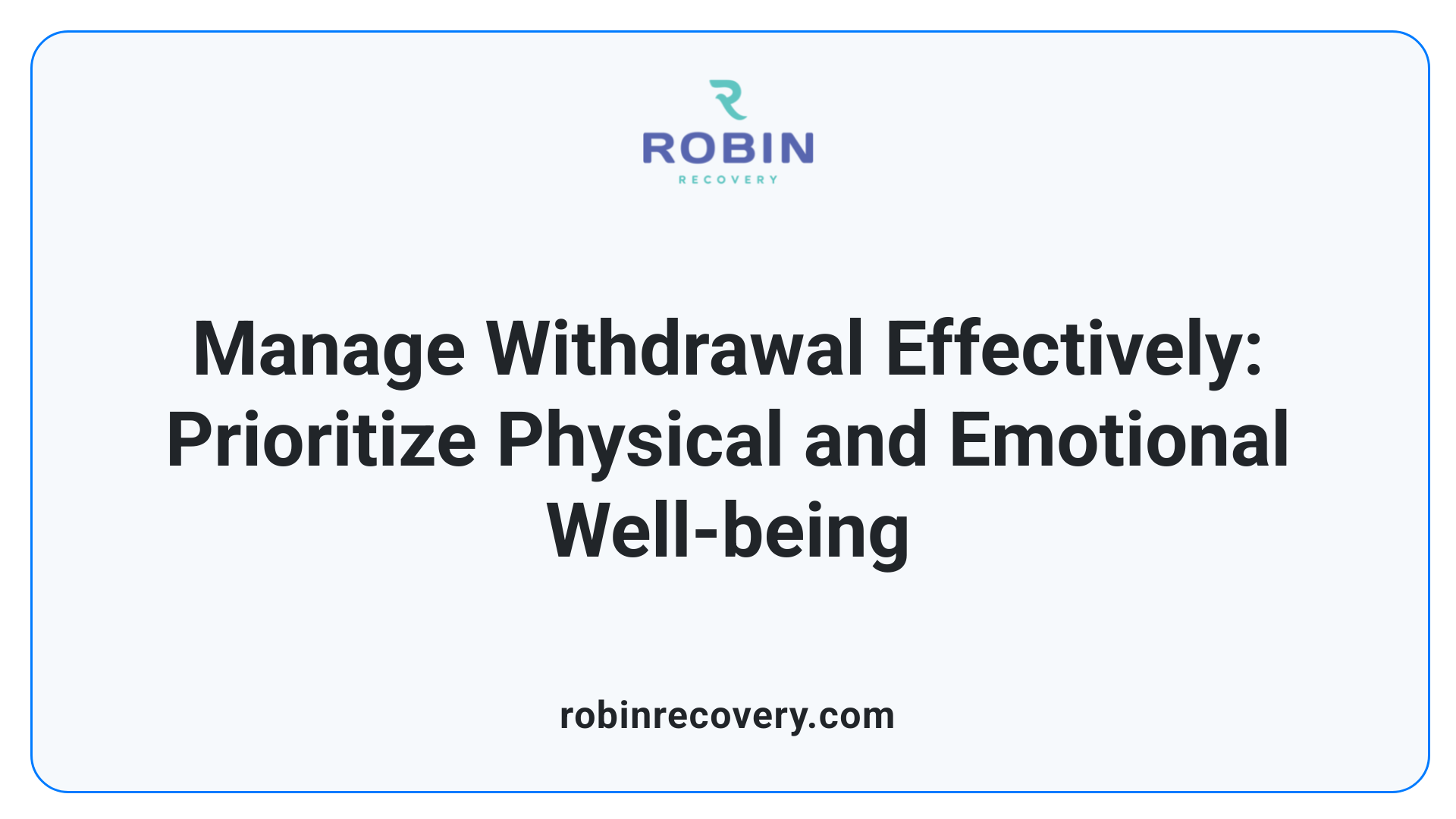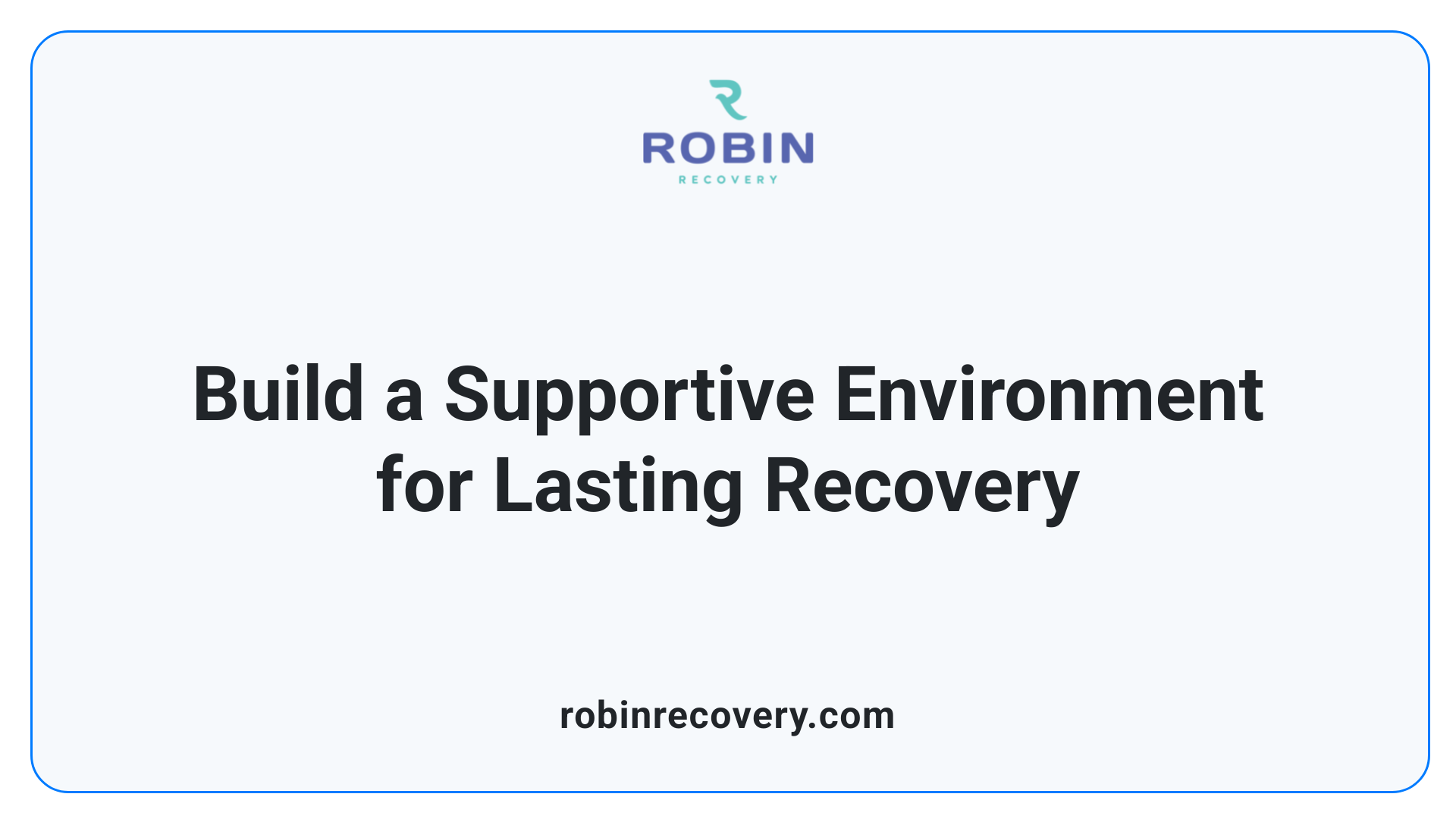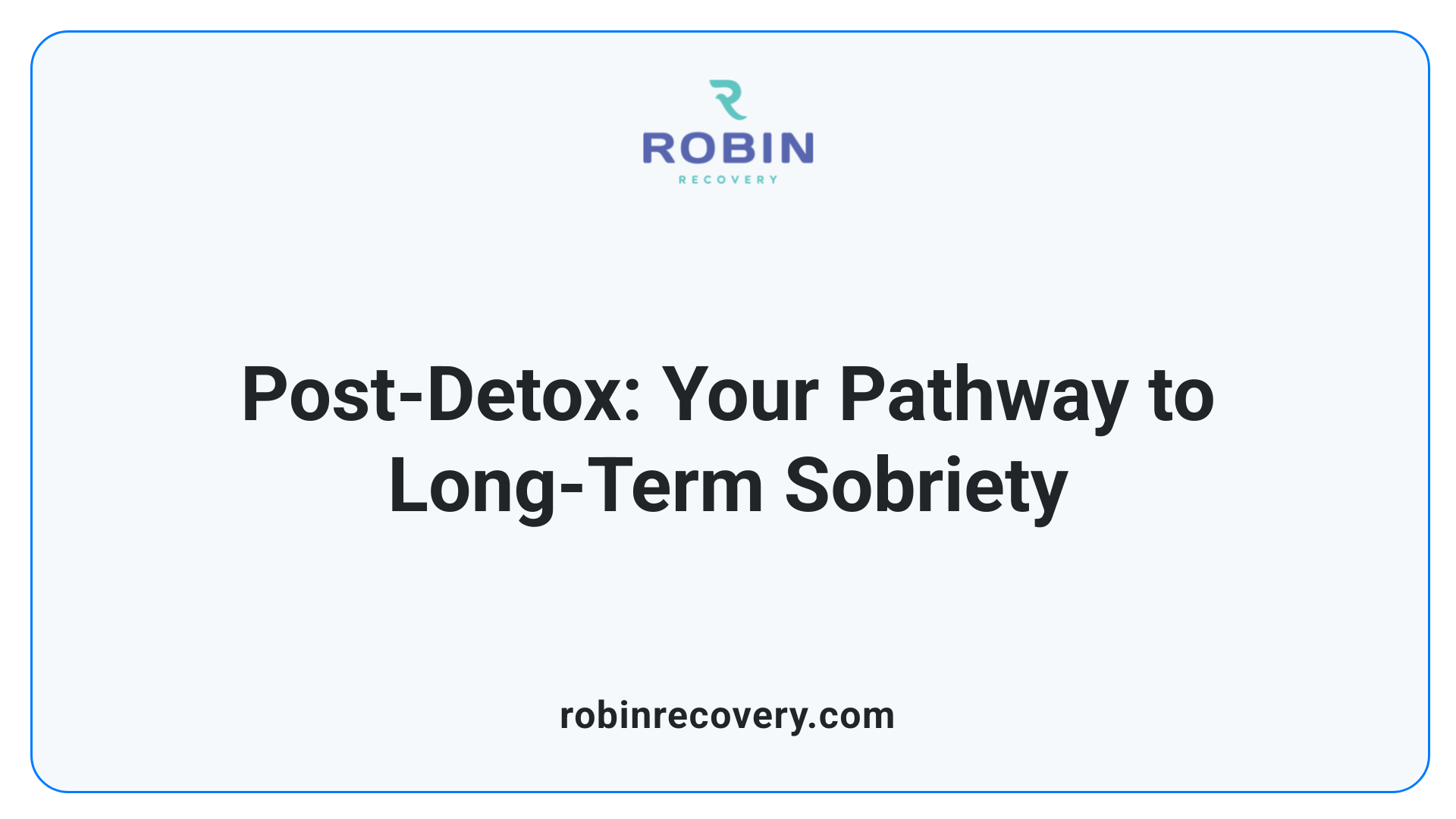How to Support a Loved One During Ambulatory Detox

Understanding Ambulatory Detox and How to Be Supportive
Supporting a loved one through ambulatory detox is a compassionate and vital step toward their recovery journey. This outpatient treatment allows individuals to detoxify in a structured, supervised environment while remaining at home, making it a flexible and accessible option. However, the process can be physically and emotionally challenging, requiring family members and caregivers to be informed, patient, and proactive in providing support. With proper understanding and preparation, loved ones can create a safe, calming environment that encourages ongoing recovery and minimizes the risk of relapse.
The Basics of Ambulatory Detox and Its Process
What is ambulatory detox and what is its purpose?
Ambulatory detox, also known as outpatient detox, is a medical treatment process designed to help individuals safely remove addictive substances from their bodies while allowing them to continue living at home. The main goal is to manage withdrawal symptoms effectively, reduce risks, and prepare the person for ongoing treatment and recovery. Unlike inpatient detox, ambulatory detox offers more flexibility, making it an ideal choice for those with milder dependence or strong family support systems.
During this process, trained healthcare professionals evaluate the patient's medical history and the substances involved. They develop a personalized plan that includes medications to ease withdrawal symptoms and monitor progress closely. The process emphasizes safety, comfort, and gradual detoxification, all while fostering an environment conducive to long-term recovery.
How is medical oversight delivered and what safety measures are in place?
Medical oversight during ambulatory detox is crucial because withdrawal symptoms can be physically and emotionally intense. Patients are typically assessed and treated by nurses, doctors, or addiction specialists who evaluate the severity of dependence and determine appropriate medication regimens. They also monitor vital signs continuously to prevent complications such as seizures, delirium tremens, or other medical emergencies.
For safety, medications like methadone, buprenorphine, or clonidine might be used to manage specific withdrawal symptoms, and blood pressure, heart rate, and hydration levels are regularly checked. Emergency protocols are established, and follow-up appointments ensure ongoing support. Patients are advised to stay in contact with healthcare providers throughout the detox period.
What are the different types of detox and what should individuals expect?
There are primarily two types of outpatient detox: inpatient (hospital-based) and outpatient (ambulatory). The choice depends on the severity of dependence, medical history, and available support systems.
Inpatient Detox
- Provides 24/7 medical supervision.
- Suitable for severe addictions and high-risk withdrawal cases.
- Offers comprehensive care including medication, therapy, and supported rest.
Outpatient (Ambulatory) Detox
- Offers flexibility, allowing individuals to live at home.
- Involves scheduled visits for medical assessment and medication management.
- Patients typically attend therapy sessions and support groups.
What should individuals expect during detox?
During detox, individuals can expect to experience withdrawal symptoms such as nausea, sweating, tremors, anxiety, and irritability. Some may face more severe symptoms like seizures or hallucinations, especially without medical supervision. The duration of detox varies but generally lasts from a few days to a week.
Supportive care, medications, proper hydration, and comfort measures help manage symptoms. Withdrawal symptoms tend to peak within the first 48 to 72 hours and gradually subside.
How can withdrawal symptoms be effectively managed?
Supporting someone through withdrawal involves medical supervision, as severe cases require medications to reduce discomfort and prevent complications. Hydration, nutritious meals, and gentle physical activity support physical health.
Relaxation techniques like deep breathing, meditation, and engaging in distraction activities can lessen anxiety and cravings. Participation in support groups and counseling during and after detox also bolster emotional resilience.
When should you seek professional help?
Signs indicating the need for professional intervention include:
- Severe withdrawal symptoms like seizures, hallucinations, or severe tremors.
- Co-occurring mental health disorders needing simultaneous treatment.
- Risks of medical complications due to underlying health conditions.
- Physical harm or risky behaviors related to substance misuse.
If dependence interferes with daily functioning or causes harm, early professional help improves safety and recovery outcomes. Resources like SAMHSA’s National Helpline (1-800-662-HELP) are available 24/7 for referrals and assistance.
Additional Information
Aspect Details Additional Info Types of detox Inpatient and outpatient Depends on severity; outpatient offers flexibility Expected symptoms Nausea, anxiety, tremors, hallucinations Vary with substances; managed with medication Safety measures Continuous monitoring, medications Emergency protocols, follow-up care Support strategies Hydration, therapy, distraction Involvement of loved ones, professional guidance When to seek help Severe withdrawal, health risks Use helpline, consult healthcare providers
Understanding the different forms of detox, what to expect, and when to seek professional help can empower individuals and their families. Managed properly, ambulatory detox can serve as an effective first step towards lasting recovery, especially when combined with ongoing therapy and support.
Recognizing the Signs of Withdrawal and When to Intervene

What signs indicate that a loved one needs detoxification or is experiencing withdrawal?
Understanding the physical and emotional cues of withdrawal is vital for timely intervention. Physical symptoms often include tremors, sweating, nausea, headaches, muscle aches, and a rapid heartbeat. These signs typically emerge within hours after cessation of substance use and reach their peak in a few days. Emotional indicators can be just as telling; they include irritability, anxiety, restlessness, mood swings, and even hallucinations in severe cases.
In some instances, individuals may experience lingering psychological symptoms like cravings and sleep disturbances, which can persist for weeks. Severe withdrawal signs—such as seizures, hallucinations, confusion, or psychosis—are medical emergencies requiring immediate professional care. Recognizing these symptoms early enables prompt action, which can be life-saving. It is important to seek professional supervision during detox to manage symptoms safely and reduce health risks.
How can I recognize if a family member has a substance use disorder and what steps should I take?
Detecting a substance use disorder (SUD) in a family member involves observing behavioral, physical, and emotional changes. Key signs include a sudden shift in mood, withdrawal from social activities, secretiveness about whereabouts, and neglect of personal or professional responsibilities. Physically, signs can be more subtle—dilated pupils, frequent nosebleeds, track marks, or unexplained injuries.
Behavioral symptoms such as increased tolerance, unsuccessful prior attempts to stop, and continued use despite negative consequences are red flags. Additional clues include craving, spending excessive time or money on substances, and risky behaviors. Approaching these concerns with sensitivity and care is essential.
For support, consider consulting professional resources such as SAMHSA’s National Helpline at 1-800-662-HELP. This free, confidential service provides 24/7 assistance to connect you with nearby treatment centers, support groups, and community resources. Early intervention facilitates effective treatment planning, which may include therapy, medication-assisted treatment, or support groups. Recognizing the issues early and seeking professional help is crucial to initiate and sustain recovery efforts.
Managing Withdrawal and Supporting Physical and Emotional Well-being

What are some effective ways to cope with withdrawal symptoms during detox?
Coping with withdrawal symptoms during detox can be challenging, but there are several strategies that promote safety and comfort. The most crucial step is to seek medical supervision, especially for individuals with severe dependence. Healthcare professionals can provide medications that alleviate symptoms, monitor health closely, and prevent complications.
Maintaining proper hydration and eating balanced meals can support physical recovery by replenishing nutrients and preventing dehydration. Engaging in gentle activities like light walking or stretching can also help reduce discomfort and boost mood. Restorative sleep and relaxation practices such as deep breathing, meditation, or progressive muscle relaxation are effective in managing anxiety and stress.
Psychological support through counseling, support groups, and therapy provides emotional resilience and motivation throughout detox. Creating a safe environment free from substances prevents the temptation to relapse, while emotional encouragement from loved ones helps reinforce commitment to recovery.
Overall, managing withdrawal involves a combination of medical, physical, and emotional strategies tailored to individual needs, ensuring a smoother transition into ongoing treatment.
What strategies can help prevent relapse after detox and during recovery?
Preventing relapse is a vital part of long-term recovery. A comprehensive approach includes ongoing therapy, such as cognitive-behavioral therapy (CBT), which helps individuals recognize and modify negative thoughts and behaviors that could trigger substance use.
Participation in support groups like Alcoholics Anonymous, Narcotics Anonymous, or family-specific groups such as Al-Anon offers peer support, accountability, and shared experiences that bolster motivation.
Developing strong coping skills is essential for managing high-risk situations—such as stressful events, social pressures, or negative emotional states—without turning to substances. Mindfulness practices, meditation, yoga, and regular exercise can enhance emotional regulation and stress resilience.
Maintaining a healthy lifestyle with proper sleep, balanced nutrition, and physical activity enhances physical and emotional strength. Recognizing early warning signs like cravings, mood swings, or social triggers allows individuals to intervene promptly.
Having a personalized relapse prevention plan that involves family or trusted friends provides additional support. Professional monitoring, medication management if needed, and regular check-ins with healthcare providers can further reduce risks.
Overall, relapse prevention relies on a combination of behavioral, emotional, and social strategies that create a stable foundation for sustained sobriety.
Creating a Supportive Environment and Family Involvement

How can I support a loved one during ambulatory detox and recovery?
Supporting a loved one during ambulatory detox and recovery is a vital aspect of the healing process. It begins with education—understanding that addiction is a chronic brain disease affected by genetics, environment, and life experiences can foster compassion and patience. Offering consistent emotional support by listening attentively, validating their feelings, and encouraging positive behaviors creates a reassuring environment.
Creating a substance-free, calm, and safe physical space helps minimize triggers. Remove drugs, alcohol, and temptations from the home, and secure all prescriptions safely out of reach. Participating in family therapy sessions or providing ongoing encouragement through support groups like Al-Anon or Nar-Anon can strengthen emotional bonds and provide additional resources.
Patience is crucial, as recovery is a gradual process with potential setbacks and relapses. Show your loved one that you believe in their ability to recover and remind them of available treatment options, including outpatient therapy and support groups. Your unwavering support, combined with professional help and self-care, provides the foundation for long-term sobriety. Remember, caring for yourself is equally essential—maintaining your mental and physical health enables you to be a better supporter.
What practical do's and don'ts are recommended when supporting someone during ambulatory detox?
Practical support involves a combination of education, patience, and active participation. Do familiarize yourself with the detox process, common withdrawal symptoms, and available resources such as SAMHSA’s National Helpline at 1-800-662-HELP (4357). Gather information on local treatment centers and support groups.
Do encourage open communication, listen non-judgmentally, and maintain a calm, supportive demeanor. Help your loved one by removing triggers from their environment—this includes drugs, alcohol, and anything associated with past substance use. Attend medical appointments with them when possible, and ensure medications are stored safely to prevent misuse.
Avoid enabling behaviors like providing substances or covering responsibilities that might enable continued use. Refrain from judgmental language or pressuring them, as this can hinder recovery efforts. Instead, promote a positive outlook and reinforce their motivation.
Building a network of support through family involvement, professional help, and peer groups ensures your loved one feels less isolated and more motivated to stay on track. Remember to also look after your well-being; supporting someone through detox can be emotionally taxing, so seek your own support networks and counseling if needed.
How can mental health issues related to substance use be identified and addressed?
Identifying mental health issues intertwined with substance use requires vigilance for symptoms such as persistent feelings of sadness, anxiety, irritability, mood swings, or social withdrawal. Screening tools like the GAIN screener can help detect early signs, especially during adolescence when many mental illnesses and substance use issues emerge.
Early detection allows for prompt intervention. Treatment strategies should be integrated, combining behavioral therapies—such as Cognitive Behavioral Therapy (CBT), Dialectical Behavior Therapy (DBT), or Multisystemic Therapy (MST)—with appropriate medications tailored to individual needs.
A multidisciplinary care team works collaboratively to address both mental health and substance use disorders simultaneously, improving the overall outcome. Encouraging ongoing counseling, medication adherence, and participation in support groups helps prevent the escalation of co-occurring issues. Additionally, families can engage in psychoeducation to learn how mental health impacts substance use and vice versa, fostering an environment conducive to recovery.
Understanding that mental health issues and addiction are interconnected underscores the importance of comprehensive treatment, early intervention, and continuous support for lasting recovery.
Post-Detox Care and Long-Term Support for Sustained Recovery

What are some ongoing treatment options post-detox?
After completing detoxification, individuals are encouraged to engage in comprehensive addiction treatment programs designed to sustain long-term sobriety. These options include outpatient therapy, residential rehab, support groups such as Alcoholics Anonymous or Narcotics Anonymous, and specialized programs like cognitive-behavioral therapy (CBT) or dialectical behavior therapy (DBT). Tailored treatment plans focus on addressing underlying psychological issues, building coping skills, and maintaining motivation.
Ongoing care also involves medication-assisted treatment (MAT), where appropriate, to manage cravings and prevent relapse. Family counseling and participation in alumni programs are additional avenues that provide continued emotional support and accountability. The key is a multi-faceted approach that combines medical, psychological, and social resources to support recovery in all domains.
Treatment Type Description Additional Support Offered Outpatient Therapy Regular sessions with therapists while living at home Flexibility for work and family responsibilities Residential Rehab Full-time inpatient programs Intensive therapy, peer support, structured environment Support Groups Peer-led meetings Shared experiences, motivation, encouragement Medication-Assisted Treatment Medications like methadone, buprenorphine Reduces cravings, stabilizes mood Family Counseling Therapy aimed at family dynamics Improves communication, rebuilding trust
Why is family involvement important in recovery?
Family plays a pivotal role in supporting recovery, providing emotional stability and reinforcement. Engage family members in counseling sessions to foster better understanding, address enabling behaviors, and learn healthy ways to communicate.
Family programs offer education about addiction as a disease, helping loved ones view it through an empathetic lens. Involvement in family therapy sessions allows for resolving conflicts, rebuilding trust, and strengthening relationships.
Participating in ongoing family-centered programs like Al-Anon or Nar-Anon helps family members manage their own emotional health while supporting their loved ones.
How can celebrating milestones and fostering motivation assist in recovery?
Recognizing and celebrating small successes, such as days of sobriety or participation in therapy, helps reinforce positive behavior and build confidence.
Setting achievable goals and acknowledging progress fosters a sense of accomplishment, which motivates continued effort.
Creating an environment where milestones are celebrated—through simple rewards or special activities—keeps spirits high and reinforces the individual's commitment.
Encouragement from family and support groups during milestones inspires continued resilience, making setbacks more manageable and recovery more sustainable.
Milestone Celebrations Examples Impact on Recovery Additional Ideas 30 Days Sober Small party, personal gift Boosts confidence Personal achievements such as job or education milestones Completing Treatment Certificate, family gathering Reinforces accomplishment Sharing success stories in support groups Maintaining Long-Term Sobriety Public acknowledgment, personal reward Encourages ongoing commitment Planning future goals to stay motivated
How Supporting a loved one's journey through addiction recovery and relapse prevention helps
Supporting someone involves participating in family programs, encouraging ongoing treatment, and celebrating milestones to reinforce their motivation.
Join family support groups like Al-Anon or Nar-Anon to share experiences and gain insights. Monitor your loved one's progress, attend therapy sessions when appropriate, and help create a supportive environment free from triggers.
Addressing setbacks with patience and understanding, rather than judgment, is essential. Reinforce their efforts and remind them of the progress made.
Do's and Don'ts when supporting someone during ambulatory detox
Do:
- Maintain a patient, compassionate attitude.
- Secure substances and medications safely.
- Encourage medical and psychological support.
- Assist with appointments and transportation.
- Offer emotional reassurance and active listening.
Don't:
- Force or coerce into treatment.
- Enable substance use through gestures or support.
- Ignore withdrawal symptoms or health risks.
- Blame or criticize.
- Neglect your own mental health needs.
Supporting during ambulatory detox requires a combination of understanding, preparedness, and ongoing communication. Creating a substance-free environment and seeking professional guidance are crucial.
How can mental health issues related to substance use be identified and addressed?
Many individuals battling addiction also face mental health challenges such as depression, anxiety, and behavioral changes.
Early signs include persistent sadness, irritability, withdrawal from activities, changes in sleep or appetite, and increased substance use.
Addressing these involves a comprehensive approach that includes behavioral therapies—like CBT, DBT, and family counseling—and medication when necessary. Engaging mental health professionals ensures that both addiction and mental health issues are treated concurrently.
Creating a supportive environment that encourages open dialogue helps in early identification and reduces stigma. Continuously educating oneself about the interconnectedness of mental health and substance use supports effective intervention and recovery.
Signs of Mental Health Challenges Behavioral Changes Support Strategies Additional Resources Persistent sadness Withdrawal from family and friends Integrated treatment plans Mental health screening tools Anxiety or irritability Increased substance use Psychoeducation about dual diagnosis Support groups for mental health Sleep disturbances Neglecting personal responsibilities Medication and therapy Online webinars and workshops
Understanding and addressing mental health issues as part of addiction recovery is vital for achieving and maintaining sobriety. These efforts foster resilience and improve overall well-being.
Post-Recovery Support and Community Engagement
Supporting a loved one's journey through addiction recovery and relapse prevention
Supporting someone through addiction recovery is a continuous process that extends beyond detox and into long-term sobriety. One of the most effective ways families can help is by participating in specialized family programs. These programs are designed to educate relatives about addiction, providing vital resources and tools to offer informed and compassionate support.
Family involvement fosters a sense of stability and motivation for the recovering individual. It also helps reduce feelings of isolation and shame that often accompany addiction. Family therapy sessions are instrumental in repairing broken relationships, strengthening communication, and establishing healthier interactions.
In addition to professional treatment and therapy, encouraging ongoing engagement in support groups such as Al-Anon, Nar-Anon, and Co-dependents Anonymous offers shared understanding and emotional relief. Celebrating milestones, no matter how small, reinforces hope and motivation. Maintaining regular contact with alumni groups and continuing education about addiction further sustain resilience.
Overall, a supportive environment that combines professional resources, ongoing education, and emotional encouragement plays a crucial role in preventing relapse and fostering a sustainable recovery.
What strategies can help prevent relapse after detox and during recovery?
Relapse prevention is vital for long-term sobriety. Strategies should be tailored to the individual’s needs but generally include ongoing therapy, participation in support groups, and development of coping skills.
Cognitive-behavioral therapy (CBT) helps modify negative thinking patterns and build positive behaviors. Support groups like Alcoholics Anonymous or Narcotics Anonymous provide ongoing peer support, reducing feelings of loneliness and reinforcing commitment to sobriety.
Developing a set of coping mechanisms to handle stress, negative emotions, and high-risk situations is essential. Practices like mindfulness meditation, yoga, and stress management techniques increase resilience.
Recognizing early warning signs—such as cravings, social triggers, or emotional distress—and having a clear relapse prevention plan is critical. Avoiding high-risk environments, such as places associated with substance use, and establishing healthy routines also support recovery.
Collaborating with healthcare professionals for medication management and ongoing monitoring ensures the support system adapts to changing needs, significantly decreasing the chance of relapse.
The role of family and community resources
Family and community resources serve as the backbone of sustained recovery. Family members, equipped with proper knowledge and supported through programs, become active participants in nurturing a sober lifestyle.
Community organizations provide access to support groups, counseling, educational workshops, and relapse prevention programs. These resources promote social connection and shared accountability.
Many treatment facilities also offer long-term outpatient services and follow-up care, essential for maintaining progress after initial treatment phases.
Engaging with local community centers, health clinics, and faith-based groups can create a network of support tailored to individual needs. Such involvement fosters a sense of belonging and purpose, which are important for long-term sobriety.
Encouraging participation in support groups
Support groups are a cornerstone of ongoing recovery efforts. They offer a platform for sharing experiences, challenges, and successes with others facing similar struggles.
Participation can diminish feelings of isolation and provide accountability, motivation, and an understanding community. Regular attendance at meetings like AA, NA, or local therapy groups builds routine and resilience.
Families can also attend support group meetings such as Al-Anon or Nar-Anon, which focus on supporting loved ones of addicts. These groups help family members manage their emotions, learn healthy boundaries, and gain practical advice.
Encouragement from family to attend these groups, alongside active involvement in treatment plans, creates a comprehensive safety net addressing both emotional and practical aspects of recovery.
Aspect Resources Additional Details Family programs Sanford Behavioral Health, Al-Anon, Family therapy Education, support, and tools for family members to aid recovery Support groups AA, NA, Al-Anon, Nar-Anon Peer support, shared experiences, emotional relief Community resources Local clinics, community centers, faith-based groups Counseling, workshops, relapse prevention programs Continued treatment Outpatient programs, rehab alumni groups Long-term therapy, relapse management, and ongoing education
Engaging actively with these layered supports strengthens the foundation for a sustained and successful recovery journey.
Harnessing Family and Community Support for Lasting Recovery
Supporting a loved one during ambulatory detox is a collaborative effort that benefits greatly from a proactive, informed, and empathetic approach. Recognizing the signs of withdrawal, understanding treatment options, and creating a safe environment are fundamental steps. Engaging with professional services such as the SAMHSA Helpline provides vital guidance and support. Encouraging ongoing therapy, participation in support groups, and fostering strong family connections are key to overcoming the challenges of recovery and preventing relapse. While the journey can be emotionally demanding, the shared commitment to healthy, substance-free living can transform individual recovery into a collective triumph, reinforcing resilience and hope for a healthier future.
References
- National Helpline for Mental Health, Drug, Alcohol Issues - SAMHSA
- Supporting Your Loved One During Detox: You Are Not Alone
- How to Support a Loved One During Alcohol and Drug Detox
- Do's and Don'ts for When a Loved One Comes Home From Rehab
- How to Help a Loved One with Drug or Alcohol Addiction - Adcare.com
- What to Expect When a Loved One Goes to Addiction Rehab
- 10 Tips for Talking to a Loved One About Their Drug or Alcohol ...
- How to Support a Loved One in Addiction Recovery
